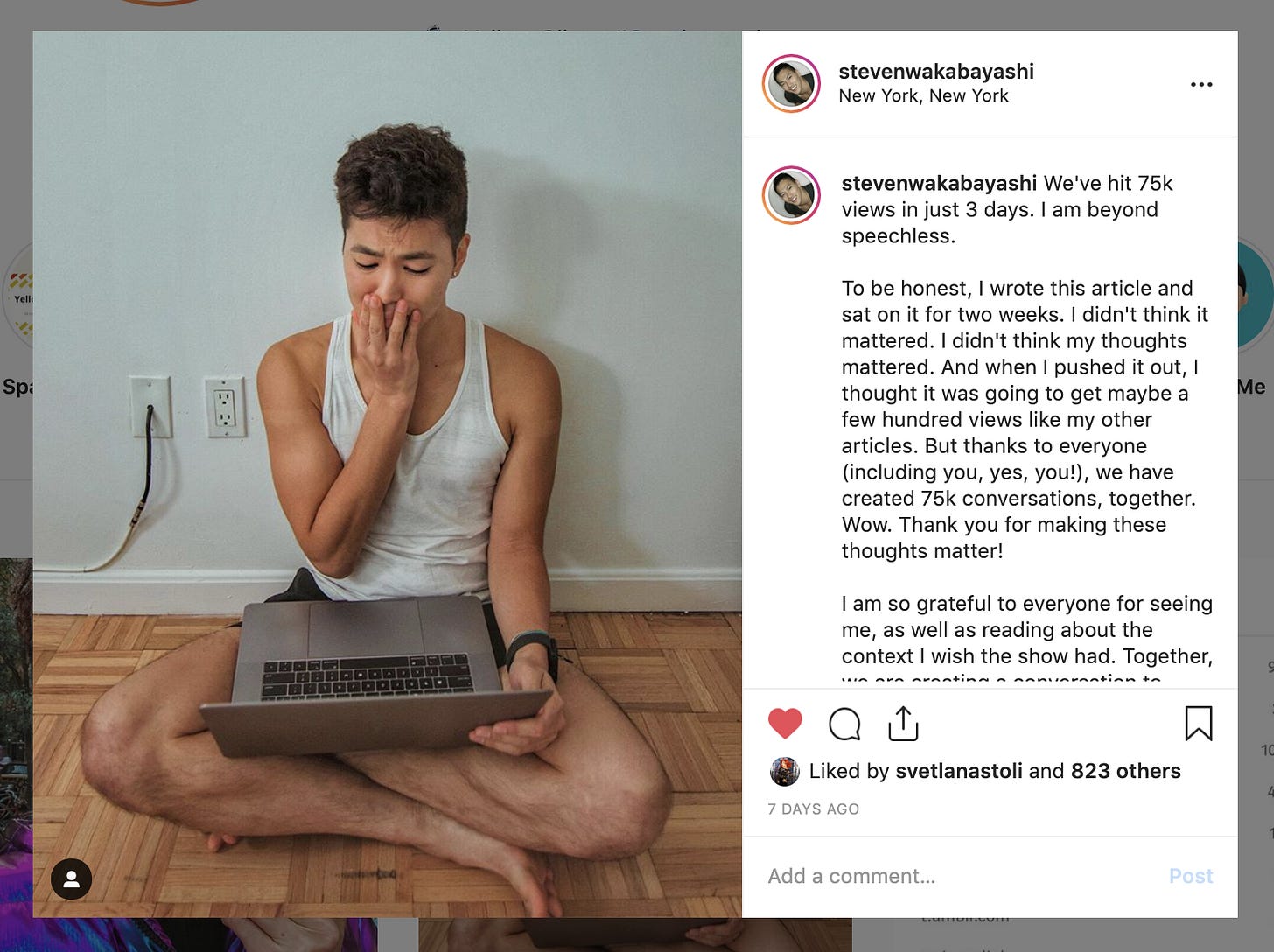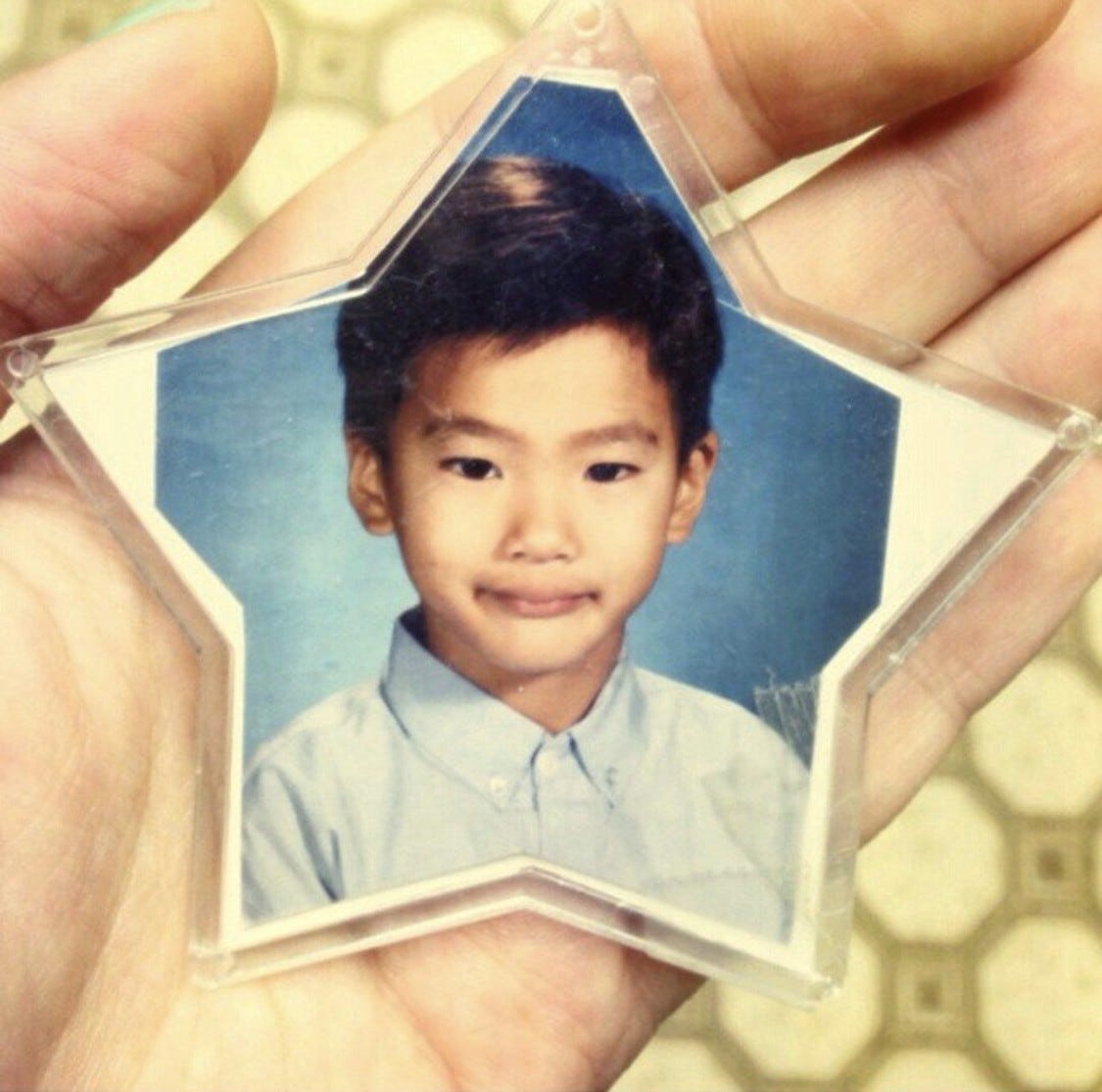Lessons from my viral article on cultural ignorance
What are we giving up and why racism is still rampant, when the body says no, Oprah and Lady Gaga, and debunking our low attention spans.
Hi friend!
If you are a new subscriber - welcome! I’m so excited to have you join me on this journey of mindfulness and life.
Just last week, I published an article on the cultural insensitivities of the latest season of Queer Eye. In four days, it had more than 100K views.

Photo from Instagram.
My Twitter, Facebook, Instagram, Gmail, Reddit, and LinkedIn (surprise!) was flooded with messages from people all around the world. When I looked at where this article was shared, there were sometimes hundreds of comments discussing this piece. It was quite the conversation-starter.
Many of the comments were incredibly heart-warming.
Countless people reached out to echo the very sentiments that I wrote about, revealing the same hurt and shock I experienced while watching the show. To my surprise and delight, many Academics mentioned that they included my article in their curriculum on racial inequalities, cultural imperialism, and queering ESOL. The connections, discussions, and education that this article has fostered have moved me every single day.
But along with the kind comments came a swarm of nasty replies.
My inboxes were inundated with hateful remarks from the show’s fans. Many of whom discredit my article by questioning my identity.
“You’re just an American.”
“You’re not Japanese enough.”
“Have you lived in Japan?”
This denial of my identity is something that I am far too familiar with as an Asian-American. Somehow, by being born in a foreign country to immigrant parents, I become an alien to this world. My birthplace is not my own because my skin color doesn’t match the majority, and my racial identity is stuck overseas, unable to cross international waters.
Unfortunately for them, my identity was never theirs to define.
What ultimately pushed me to write this article was after watching the second episode, where the Fab 5 advises a queer Japanese man on how to live a happier life using Western ideologies.
Ever since I realized I was gay, for more than 22 years, I’ve followed these Western methodologies to chase after this “happiness”. I buried myself in American self-help books, media, and forums to find liberation as a queer Asian-American born to conservative immigrant parents.
“Love yourself more.”
“Find a new family.”
“Focus on yourself.”

(Almost all coming out books are by white authors)
I tried to shed “what was not serving me” for more than two decades. I dug deep within myself to rip out my heritage, my cultural roots, my family, and my skin to taste salvation. As I tore apart my racial identity, the taste of grief still lingered. Unknowingly, I had lost what anchored me before. I stumbled into dark moments of my life, blindly wandering and piecing together an image of myself with whatever I could find in a foreign land I called home.
It took me years of self-work and therapy to address the damage caused by this one-sided advice. Just because a lifestyle works in one culture doesn’t necessarily mean it will work within another. To believe otherwise is blind, ignorant, and dangerous.
In giving advice, especially from another culture, we need to caveat: “what are we giving up in doing this?”
In choosing to love myself using Western ideologies, what was I giving up?
In finding a new family, what was I giving up?
In focusing only on myself, what was I giving up?
And in challenging Japanese people with Western advice on Queer Eye Japan, what were they giving up in doing this?
Ironically, if the show’s advice were to have more self-love, it should have included finding love for the racial identity that cannot be separated.
No matter how we feel on the inside, our racial identity is forever imprinted on our skin. It will cover us, protect us, hurt us, and identify us for the rest of our lives.
In writing this piece, three lessons kept coming up:
This conversation will never be perfect.
I received many messages with corrections — to make the article more accurate and inclusive. Though I had initially thought that this piece was going to be read mostly by my friends, there is never an excuse for why I cannot be more conscious with my writing.
Thank you to everyone who pointed out grammatical errors, spelling mishaps, wrong pronouns, and exclusive language.
I am humbled that people would take the opportunity to help educate me and grateful for the time to do so. I acknowledge that my writing is never perfect, but all I can do is try my best, learn from my experience, and be more mindful every day.
There may never be a perfect piece, but it doesn’t mean we should stay silent.
Self-doubt is real, but false.
I initially finished this article just two days after the show launched on Netflix. I sat on it for two weeks, doubting myself, questioning whether my thoughts were valid.
If it were never published, hundreds of thousands of conversations regarding cultural insensitivity would never have happened. And the thousands of people that have reached out to me personally would have never been heard.
Although it’s tough to disagree with something publicly, we have the right to our own experiences. We are all unique — different education, families, genetic makeup, birthplaces, likes, dislikes, hobbies, and careers that lead us to have our unique perspective in the world. Though it might not always align with what has the most visibility at the time, there might be others who think similarly in a world with 7.7 billion people.
When we hide our truths from the world, we suppress what may be crucial conversations that can move us towards equality, inclusion, and representation.
Racism and intolerance is still a very real thing.
The fact that this has prompted so many conversations in over a week signifies that cultural awareness is an important topic that we need to continue talking about. All of the negative responses to this article validates the work that has yet to be done.
When someone hurts, we must listen to them. Regardless of whether we agree or disagree, we listen because we respect and care for them. Especially as we become more interconnected with each other globally, it is critical that we continue to uphold empathy and humanity to create space for different types of people and thoughts.
Challenge ideas, but welcome diversity.
Critique actions, but embrace people.
I wrote this article as advice I wish I had gotten growing up: finding true happiness comes from the unconditional love of self, including the cultural and racial identities that may come with difficulties.
I am queer.
I am Japanese.
I am Taiwanese.
I am American.
The path to happiness is found in the shape of our identities.

(When I was ~seven years old)
After publishing this article, a lot of people have reached out to me regarding new opportunities and partnerships. So excited to see where all of this will go in the next few months! Stay tuned.
When the body says no
One of the most insightful books I’ve read this year. Dr. Gabor Mate shares his take on the true causes of cancer, auto-immune disorders, digestive issues, and other diseases in his book, When the Body Says No: The Cost of Hidden Stress. (TLDR: when we refuse to listen to our body, it creates diseases to make us listen.)
Oprah meets Lady Gaga
On her latest episode of Super Soul Sunday, Oprah interviews Lady Gaga to talk about staying kind, battling suicide, “tell me, don’t show me”, and more.
Low attention span
An article recently posted by BBC busts the myth that our attention span is decreasing:
In the always-connected world of social media, smartphones and hyperlinks in the middle of everything you read, it can feel that much harder to stay focused.
And there are statistics too. They say that the average attention span is down from 12 seconds in the year 2000 to eight seconds now…
But the sources are infuriatingly vague… And when I contact the listed sources - the National Center for Biotechnology Information at the US National Library of Medicine, and the Associated Press - neither can find any record of research that backs up the stats. My attempts to contact Statistic Brain came to nothing too. I have spoken to various people who dedicate their working lives to studying human attention and they have no idea where the numbers come from either.
In fact, they think the idea that attention spans are getting shorter is plain wrong.

As always, thanks for reading!
P.S. If you enjoyed this, share or sign up here: mindfulmoments.substack.com
Anything else? You can always hit "reply" to email me directly. 💌
Have a beautiful day!
Metta (loving-kindness),
Steven
Yellow Glitter Podcast | IG | YT | FB | TW | StevenWakabayashi.com

